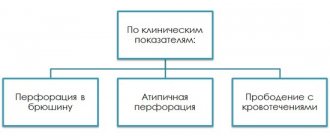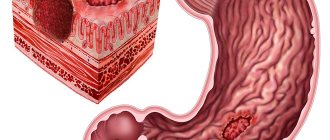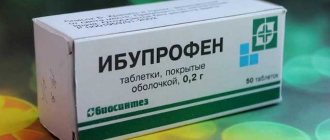Drinking a decoction of dried fruits is beneficial for the digestive system.
- Limit the consumption of sweets and flour products.
- Avoid fried, spicy, salty and fatty foods, as well as caffeine-containing drinks.
- Avoid drinking soda.
- Eat small meals, 4-5 times a day in small portions.
- Add mucous and vegetable puree soups and ground porridge to the diet.
- Drink decoctions of dried fruits, chamomile and rose hips.
- Prepare jelly.
- Consume dairy products, eggs, fruits and vegetables.
- Use lean meat and fish for cooking.
- Prepare steamed, boiled and baked dishes.
- Drink at least 2 liters per day.
Return to contents
How to prevent the disease?
To prevent the development of stomach and intestinal diseases, it is necessary to adhere to the rules of dietary nutrition and medication therapy. It is imperative to stop drinking alcoholic beverages and smoking. It is recommended to undergo sanatorium-resort treatment. If diseases of the abdominal cavity and gastrointestinal tract occur, you should immediately contact a specialist. If symptoms of intestinal inflammation reoccur, you need to go to your doctor and adjust your treatment.
Causes
Experts identify the main reasons that cause gastritis of the duodenum:
- long-term consumption of unhealthy food, stress, chronic diseases, abuse of bad habits;
- food poisoning, impaired blood circulation in the intestinal area, inflammation of the gallbladder and pancreatic tumor;
- Helicobacter pylori;
- if the intestines have reduced tone of its walls, this is due to the presence of adhesions and scars, which provokes a slow passage of food;
- long-term use of certain medications.
Symptoms
In the initial stage, signs of the disease may be subtle, but at the slightest suspicion you should not delay visiting a doctor who will help to accurately establish the diagnosis. Among the obvious symptoms are:
- lack of appetite, while the patient experiences weight loss, weakness and fatigue;
- stool is disturbed;
- body temperature rises;
- suffer from pain in the stomach, which is accompanied by nausea, turning into vomiting;
- frequent heartburn.
It is necessary to recognize the symptoms in time, and then treatment should follow in a timely manner.
Important! There is no need to self-medicate, since eliminating the symptoms will not get rid of the disease, and the patient’s condition will worsen every day.
Classification of the disease
There are several classifications of pathology; the manifestation of symptoms and treatment of duodenal gastritis will depend on the specified diagnostic indicators.
By degree of development:
- acute, it occurs with pronounced symptoms;
- chronic – the symptoms are erased and may not bother you until periods of exacerbation. More often they occur seasonally, or after overindulging in unhealthy foods.
Experts emphasize that the intestinal mucosa with gastritis in the chronic form is damaged more and more deeply than in the acute form.
According to the depth of tissue damage:
- superficial edematous,
- atrophic,
- erosive,
- interstitial.
By localization:
- bulbar,
- diffuse,
- local,
- postbulbar,
- papillitis
There is a specific duodenitis that occurs as a result of other diseases.
Treatment
If the disease is not treated for a long time, the patient experiences a disruption in the secretion of enzymes necessary for the digestive function, as well as a deterioration in the breakdown of food and the absorption of nutrients from it. In addition, the development of gastrointestinal pathologies is observed. Thus, the patient may develop anemia, micronutrient deficiency, diseases of the muscular, nervous, cardiovascular systems and vitamin deficiency.
Only a specialist can prescribe therapy after a detailed study of the symptoms and special diagnostics. Usually, doctors refer the person suffering from the disease to endoscopy, x-ray, ultrasound of the abdominal cavity, analysis of gastric juice, and check for the presence of Helicobacter pylori. If a specialist suspects that the disease is due to an autoimmune etiology, the patient undergoes an antibody test.
Comprehensive treatment includes medication and physiotherapy, as well as special nutrition. Drug treatment includes:
- If the disease occurs in an acute or aggravated form, first of all, the doctor prescribes antacids to relieve pain.
- Increased acid secretion can be reduced with the help of antisecretory drugs (Omeprazole, Almagel).
- To improve motor skills and prevent further development of the disease, the patient should use prokinetics and gastroprotectors (Maalox, Domperidone).
- If the bacteria that caused the disease is identified, they resort to a course of antibiotics.
- Enzyme preparations prevent undigested food from entering the intestines (Creon).
- To relieve pain, use antispasmodics (Papaverine, No-shpa).
- Enterosobrents can reduce the negative impact on the gastrointestinal tract (Smecta, Enterosgel).
- Dopamine blockers (Cerucal, Reglan) will help relieve nausea.
- Anti-inflammatory drugs with a healing effect are used (vitamin B, Methyluracil).
- Often, neurasthenia appears against the background of the disease; in order to suppress it, sedatives are taken (valerian, motherwort tincture).
Compliance with the rules of taking medications and dietary nutrition will help cope with the disease.
Among the physiotherapeutic procedures, the most popular are warming, ultrasound, paraffin, balneotherapy, ozokerite, application, electrosleep, magnetic therapy. When using these methods, the patient’s blood supply and lymph flow are activated, digestion is normalized and an anti-inflammatory effect is guaranteed.
ethnoscience
When treating duodenitis, you can use folk advice, which reduces the aggressiveness of stomach acid and protects the inflamed mucosa. Aloe, propolis, sea buckthorn oil, potatoes, medicinal herbs, and honey are often used for this. Useful recipes:
- Squeeze out 0.5 kg. aloe leaves juice, add 0.5 liters to it. red wine and 0.5 kg. honey, let the “potion” brew for 10 days, and then filter and bottle. Store the drink in the refrigerator. During the first week, the product is consumed 1 tsp. three times a day before meals. The next two weeks the volume increases to 1 tbsp. l., and in the fourth week you need to return to the original dosage again. The course of treatment is three months, for superficial duodenitis 1.5 months.
- 50 gr. propolis should be poured 500 ml. alcohol, put in a dark place for 20 days. Every day you need to shake the contents of the bottle. The course of treatment is three weeks, 15 drops in previously steamed flax seeds, on an empty stomach.
- Potato juice should be fresh; drink 0.5 cups after a meal.
- Sea buckthorn oil is consumed 1 tsp. once a day during meals. The course lasts until complete recovery.
- Every day the patient should eat 100 - 200 grams. honey, dividing this dosage throughout the day in small portions.
It should be noted that if the disease occurs against the background of other diseases, the underlying disease is treated first.
Traditional recipes for the treatment of gastritis relieve the tension of the disease
Treatment of pathology
Therapy is necessarily complex. The first thing the patient needs to do is develop a nutritional culture. The effectiveness of all subsequent treatment depends on this, the purpose of which is to eliminate the cause of the disease and eliminate any (chemical and mechanical) negative effects on the mucous membrane that cause irritation.
Next, all measures are taken to restore damaged tissue and normal functioning of the intestines.
Drug treatment
Gastritis often develops against the background of the activity of the bacterium Helicobacter pylori. Therefore, it will be relevant to undergo a course of antibacterial therapy. At the same time, the doctor prescribes auxiliary agents that protect the intestines from the harmful effects of antibiotics, enveloping the mucous membrane of the stomach and duodenum (De-Nol, Vis-Nol).
Doctors often encounter gastritis due to increased acidity of gastric juice. Therefore, such patients are prescribed drugs that inhibit the production of hydrochloric acid by the glands, for example, Omeprazole, Almagel. In addition, gastritis is characterized by a lack of enzymes in the gastric juice, which means that products that are not completely poisoned enter the intestines. Therefore, patients are required to be prescribed enzyme preparations, for example, Creon.
To normalize intestinal motility, drugs are prescribed that stimulate intestinal motility (Maalox, Domperidone), and to relieve painful sensations - No-shpu, Papaverine, Dotaverine.
For chronic gastritis of the duodenum, long-term use of the following drugs is prescribed:
- anti-inflammatory agents with a healing effect - Methyluracil, Duogastron, aloe extract, vitamin B;
- anticholinergics that relieve pain - Peritol, Atropine, Gastrocepine;
- enterosorbents that reduce the harmful effects on the gastrointestinal tract - Smecta, Enterosgel;
- dopamine blockers that suppress nausea - Reglan, Cerucal;
- Neurasthenia often develops against the background of duodenitis. To suppress their manifestations, sedatives are prescribed - motherwort infusion, valerian.
Diet
In complex therapy, proper nutrition is of great importance, which should be balanced and fortified. The patient should eat all meals only at a gentle temperature, and avoid fatty, fried, salty and seasoned foods. The patient’s daily diet depends on the characteristics of the disease:
- The acute form forces you to give up alcoholic beverages, cigarettes, canned food, sour and fresh juices, and baked goods made with yeast;
- In case of the erosive form, the menu should include mucous puree soups and porridges prepared with milk. It is allowed to eat lean meat and lean fish, which should be boiled or steamed. Peaches, apples, pears, and bananas will saturate the body. You can make jelly, jelly, compote from these fruits.
Diet No. 1 (Table No. 1). Food
What can you eat on diet number 1:
Soups: vegetable soups (from permitted pureed vegetables) in carrot or potato broth, dairy soups from pureed or well-cooked cereals, pureed soups (from pre-cooked permitted meat). You can season soups with butter, cream or egg-milk mixture.
Cereals: oatmeal, buckwheat, rice, semolina. Cook porridge in water or milk, semi-viscous and mashed. You can also steam soufflés, puddings and cutlets from ground cereals. Boiled pasta, finely chopped.
Vegetables, greens: potatoes, beets, carrots, cauliflower, early pumpkin and zucchini. Green peas limited. Vegetables can be steamed or boiled in water. Ready to grind (mashed potatoes, puddings, soufflés). Finely chop the dill and add to soups. The consumption of ripe non-acidic tomatoes is also allowed, but not more than 100 g.
Meat, fish: lean varieties, without tendons, fascia and skin in poultry and fish. Boiled and steamed dishes from veal, beef, young lean lamb, chicken, chicken, turkey, tongue and liver. Boiled meat and fish can be baked in the oven.
Eggs: 2-3 eggs per day (soft-boiled or steamed omelet).
Fresh fruits and berries: sweet fruits and berries pureed, boiled and baked.
Dairy products: milk, cream, non-acidic kefir and yogurt, fresh and non-acidic sour cream and pureed cottage cheese. Hard cheese is mild and grated. Sour cream in limited quantities.
Sweets: fruit purees, jelly, jellies, mousses, meringues, butter cream, milk jelly, honey, non-sour jam, marshmallows and marshmallows.
Flour products: wheat bread made from premium and 1st grade flour (dried or yesterday), dry biscuit, dry cookies. 1-2 times a week, well-baked savory buns, baked pies with apples, cottage cheese, jam, boiled meat, fish, eggs.
Fats: butter, cow's ghee (highest grade), refined vegetable oils in dishes.
Drinks: weak tea, tea with milk or cream, weak coffee with milk, weak cocoa, fruit compotes, freshly squeezed juices from sweet fruits and berries, rose hip decoction.
What not to eat on diet number 1:
- any broths and sauces based on them (meat, fish, mushroom), strong vegetable broths, okroshka, cabbage soup, borscht;
- fatty meats, poultry and fish, stringy varieties, duck, goose, salted fish, smoked meats, canned food;
- white cabbage, turnips, radishes, rutabaga, sorrel, spinach, onions, cucumbers, mushrooms, salted, pickled and pickled vegetables, canned vegetables;
- fresh bread, rye, butter and puff pastry;
- legumes, whole pasta, pearl barley, barley and corn, millet;
- dairy products with high acidity, salty and sharp hard cheeses, limited use of sour cream;
- sour, not fully ripe, fiber-rich fruits and berries, unprocessed dried fruits, ice cream, chocolate;
- black coffee, all carbonated drinks, kvass;
- tomato sauces, mustard, pepper, horseradish.
Diet No. 1 (table No. 1): menu for the week
Diet No. 1 is varied and healthy. Below is a sample menu for the week.
Food must be cooked in crushed or pureed form, boiled in water, steamed or baked. The food consumed must be warm (very hot and cold are excluded).
Monday
Breakfast: steam omelette, milk semolina porridge, tea with cream. Lunch: rose hip decoction. Lunch: potato soup, chicken fillet, boiled carrots. Afternoon snack: cottage cheese with fruit. Dinner: mashed potatoes and milk, steamed fish, green tea. Before bed: milk.
Tuesday
Breakfast: pumpkin porridge with milk, weak cocoa. Lunch: sweet fruits. Lunch: cauliflower soup, boiled carrot salad, compote. Afternoon snack: jelly. Dinner: pasta with grated cheese and boiled beef with cream sauce, tea with milk. At night: grated peach with cream.
Wednesday
Breakfast: soft-boiled eggs, rice milk porridge (ground), weak coffee with cream. Lunch: fruit salad with cream and jam. Lunch: vegetable milk soup, boiled fish with vegetables, compote. Afternoon snack: pastila. Dinner: buckwheat porridge, boiled turkey meatballs, boiled vegetables, tea with milk. At night: green tea with milk.
Duodenal gastritis: symptoms and treatment
Have you been struggling with GASTRITIS and ULCERS for many years without success?
“You will be amazed at how easy it is to cure gastritis and ulcers just by taking it every day.
Gastritis is one of the most common diseases of the digestive system, which is characterized by inflammation of the mucous surface of the gastrointestinal tract. In this case, we are talking about an inflammatory process that affects the duodenal mucosa.
In the case of erosive damage to the intestinal mucosa, they speak of the development of duodenitis gastritis or gastroduodenitis. Gastritis of the duodenum very rarely acts as an independent disease - most often the inflammatory process develops against the background of another pathology of the digestive system.
Causes of gastritis of the duodenum
Expert opinion
Irina Vasilievna
Practicing gastroenterologist
Experts note that gastritis of various etiologies occurs against the background of such negative factors as stress, poor diet, nicotine or alcohol abuse, unfavorable environment, and harmful working conditions. Doctors say the most common cause of the disease is a bacterial infection.
Most often, gastritis of the duodenum develops against the background of such pathologies as:
- chronic gastritis of the stomach,
- pancreatitis,
- cholecystitis,
- weakening of intestinal tone,
- tumor formations in the gastrointestinal tract.
Inflammation can occur due to mechanical damage to the mucous membrane in the presence of adhesions and scars that prevent the normal movement of digested food.
The cause may be the use of certain groups of medications, as well as chemical poisoning. Infection with bacteria occurs in two ways: descending or ascending. In the first case, Helicobacter penetrates from the stomach, in the second from the small intestine. In the vast majority of cases, duodenal gastritis is secondary, that is, it is a consequence of other chronic gastrointestinal ailments.
Causes of the disease
In most cases, gastritis of the duodenum is formed against the background of another disease of the gastrointestinal tract - gastritis of the gastric mucosa, pancreatitis, cholecystitis.
Other factors also influence the development of inflammation:
- Various pathologies of the gallbladder.
- Neoplasms in the pancreatic cavity.
- Failure of blood circulation in the gastrointestinal tract.
- An infection caused by the bacterium Helicobacter pylori.
- Decreased muscle activity of the intestinal walls.
- Food poisoning.
- Long-term use of certain medications, such as non-steroidal anti-inflammatory drugs.
An important role in the development of gastritis of the duodenum is played by poor nutrition. Frequent consumption of fried, fatty, smoked, pickled foods, strong black coffee, alcoholic beverages, as well as a love of smoking can provoke the development of an inflammatory process in the cavity of the duodenum.
ethnoscience
Herbal medicine for gastritis of the duodenum includes the use of infusions and decoctions of medicinal herbs, such as:
- chamomile,
- celandine,
- St. John's wort,
- yarrow,
- plantain,
- peppermint,
- nettle,
- chicory,
- rose hip,
- bearberry,
- calamus (rhizome),
- centaury.
Alternative medicine widely uses bee products (honey, propolis), fresh juices from potatoes and cabbage .
To prepare an infusion that relieves the symptoms of chronic duodenitis, take two parts of chamomile, yarrow and St. John's wort and one part of celandine.
The raw materials are ground, after which a couple of tablespoons are steamed in a ½ liter thermos for several hours. Drink a third of a glass of the infusion before meals. The duration of therapy is from 4 weeks to one and a half months.
Honey and aloe juice have a wound healing and anti-inflammatory effect. For the treatment of gastritis and duodenitis, a mixture consisting of the following components is recommended:
- viburnum berries ½ tbsp,
- chopped chaga 2 tbsp,
- aloe juice ½ tbsp,
- honey 300 ml.
Viburnum is poured with boiling water, kneaded, allowed to brew for a day and the ground mushroom is added. After two days, the liquid is decanted, aloe and honey are added.
Store the product in the refrigerator, taking half a glass before meals.
Herbal treatment is carried out taking into account contraindications to the use of a particular plant. It is better to use folk remedies during the period of remission, having previously agreed with the doctor.
On our website: How to cure subatrophic gastritis?
Stages of the disease
Gastritis of the duodenum can occur in an acute or chronic stage. The acute form of the disease develops at a rapid pace - its main causes can be food poisoning, consumption of spicy or poor-quality food.
Chronic gastritis in most cases develops against the background of other pathologies of the digestive system, and is characterized by the occurrence of bleeding erosions on the mucous surface of the duodenum, which can ultimately lead to complete tissue atrophy.
Consequences of duodenal gastritis
Gastritis of the duodenum in advanced form leads to disturbances in the digestive process. The production of gastric juice decreases, or, on the contrary, becomes more active.
In the latter case, the excessively acidic contents of the stomach irritate its walls, penetrating into the intestines. Impaired breakdown and absorption of nutrients leads to vitamin deficiency, a deficiency of microelements necessary for the normal functioning of organs. Against this background, nervous and vegetative-vascular disorders also develop.
Particularly dangerous is chronic duodenal inflammation in the erosive form , which is characterized by the appearance of shallow ulcers. It leads to perforation of the intestinal walls and internal bleeding. An advanced disease is fraught with dystrophic changes in the intestines.
It is possible that untreated duodenitis can develop into another form of the disease - bulbitis .
Symptoms of gastritis
If we talk about a disease such as gastritis of the duodenum, its symptoms and treatment can be very diverse, depending on the root cause of the disease. In some cases, the initial stages of inflammation may not be accompanied by severe symptoms.
With the active development of the disease, the symptoms become more and more pronounced.
The main symptoms of gastritis include:
- Weakness, lethargy, apathy.
- Deterioration of appetite up to its complete absence, which can lead to a sharp decrease in body weight.
- Nausea, vomiting, pain in the stomach.
- Stool disorders.
- In some cases, a sharp increase in body temperature is possible.
The chronic form of the disease is often accompanied by bloating, heartburn, constant belching, a general deterioration in health and a decrease in the level of immunity.
Symptoms
The initial stage of this disease is characterized by the same manifestations as with inflammation of the gastric mucosa . Initially, the disease manifests itself with the following symptoms:
- pain in the abdominal area,
- heartburn,
- nausea and vomiting,
- weight loss,
- lethargy and loss of strength,
- flatulence and bloating,
- dyspepsia,
- bowel disorder,
- temperature increase,
- bitter belching.
In elderly patients, the disease occurs in a latent form, without pronounced symptoms. Therefore, it is recommended to undergo regular examination by a specialist.










